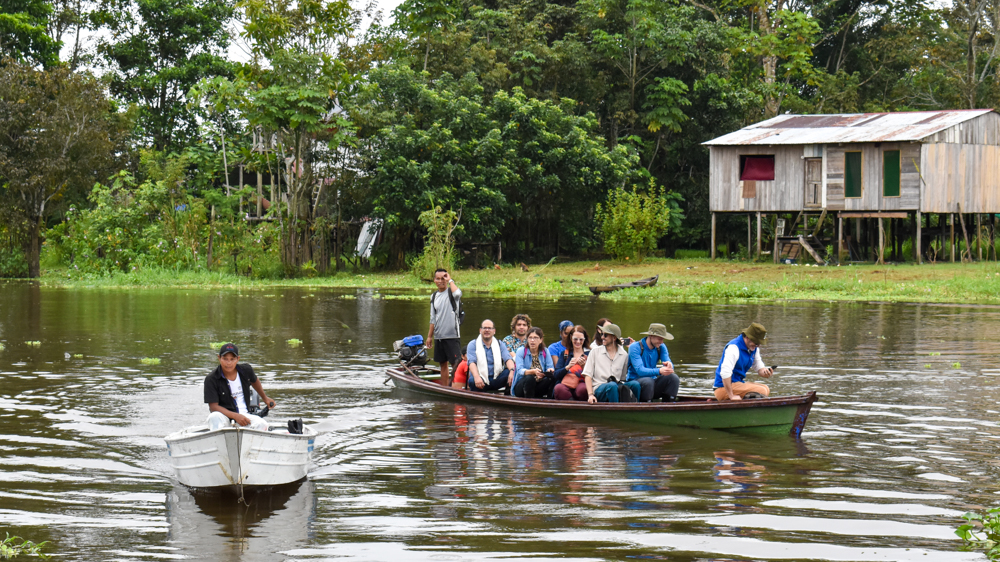
The Fulbright Amazonia Program supports interdisciplinary research to address the most pressing social, economic, and environmental issues in today’s Amazon basin. Fulbright Amazonia supports research in the countries that border the Amazon river: Brazil, Bolivia, Colombia, Ecuador, Guyana, Peru, Suriname, and Venezuela.
In December 2024, the first cohort of Fulbright Amazonia Scholars convened in Washington, D.C. to share actionable outcomes and policy recommendations developed during their collaborative research. Researchers, policymakers, and members of the public met the scholars and engaged with their work during Fulbright Amazonia Week.
Fulbright Amazonia Scholars
Amazonia Co-Lead Scholars
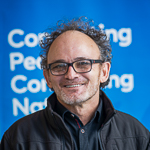
Carlos Valério Aguiar Gomes, Brazil
Carlos Valério Aguiar Gomes, PhD, is a sustainable development practitioner and researcher with almost three decades of experience working in the Brazilian Amazon. Dr. Gomes is a Professor at the Amazonian Institute of Smallholder Agriculture (INEAF) at the Federal University of Pará in Belém, Brazil. His teaching and research focus on collaborative research, policy-making for development, programs for supporting smallholder agriculture and extractivist groups, among others. At INEAF, he coordinates a specialization aimed at improving skills of professionals and community leaders who work in Conservation Units, Quilombola Territories, and Indigenous Lands.
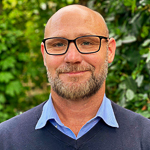
Jeffrey Hoelle, United States
Jeffrey Hoelle, PhD, is an associate professor in the Department of Anthropology at the University of California, Santa Barbara. His research focuses on human-environment relations in Amazonia, with an emphasis on understanding environmentally impactful practices, such as cattle raising and gold mining. In addition to in-depth ethnographic research on daily life and change along the frontiers of the Brazilian Amazon, Hoelle works on collaborative interdisciplinary projects that aim to understand the interlinked social, political, and economic dimensions of deforestation and land conflict. A former Fulbright Award recipient as a graduate student, Professor Hoelle has published numerous scholarly articles and also shares his research with the public in the U.S. and Brazil through presentations, newspaper articles, interviews, and a public exhibition.
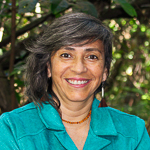
Ane Alencar, Brazil
Dr. Ane Alencar, PhD, is the science director at the Amazon Environmental Research Institute (IPAM) in Brazil, where she studies the dynamics and impacts of fire on the Amazon rainforest and its communities. She focuses on mapping fire scars with satellite imagery to assess shifts in fire regimes due to deforestation, land use, and environmental factors to improve fire management and governance strategies. As a Fulbright Amazonia Scholar, she researched fire activities in the Brazilian Amazon, highlighting their effects on protected areas in the region.
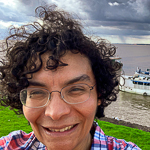
Liliana Dávalos, United States
Dr. Liliana M. Dávalos, PhD, is a professor specializing in genomics, evolution, and political ecology at Stony Brook University. Dávalos has focused on the impact of trafficking and emergent transnational organized crime on forests. Together with other scholars, she has quantified the human and economic cost of environmental disasters. Dávalos’ project has revealed, given the consolidation of transnational crime at the triple borders of the Amazon, neither declines in cocaine consumption nor drug legalization are likely to disrupt existing trafficking networks. She investigates how curbing environmental damages requires countering cross boundary links among former Revolutionary Armed Forces of Colombia (FARC) dissidents, paramilitaries, and prison gangs. As a Fulbright Amazonia Scholar to Colombia, she collaborated on aligning disaster reporting across nations in the region.

Juan Pablo Iñamagua, Ecuador
Dr. Juan Pablo Iñamagua, PhD, is an assistant professor at Universidad de Cuenca, Ecuador. His research focuses on the provision of ecosystem services in agricultural landscapes. By studying and designing agroforestry systems, he aims to contribute to more stable production systems and support their adoption at the local level. His work has identified policies that could be used to promote the use of silvopastoral systems, which integrate trees, forage, and livestock on the same land. He has drafted policies with local stakeholders to promote livestock production that could contribute to biodiversity conservation.

Rayane Pacheco, Brazil
Dr. Rayane Pacheco, PhD, is a postdoctoral researcher at the University of Bristol. She uses map-based data to investigate the socio-environmental dynamics of land grabbing and informal gold and timber extraction in the Amazonia. She has also supported conservation and forest restoration efforts through data visualization. As a Fulbright Amazonia Scholar, Rayane proposed a model to automate the selection of areas for native vegetation restoration on private lands in the Brazilian Amazon. This approach addresses challenges related to regulatory compliance, ecological benefits, and cost management.
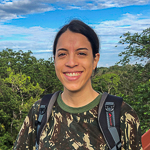
Sabina Ribeiro, Brazil
Dr. Sabina Ribeiro, PhD, is an associate professor of forest management at the Federal University of Acre (UFAC). In the last ten years, she has promoted forest conservation and the empowerment of local communities in southwestern Amazonia. As a Fulbright Amazonia Scholar, she focuses on communicating with civil society groups and individuals in southwestern Amazonia whose communities have been threatened by the expansion of large pastures, land speculation, and deforestation.

Galia Selaya, Bolivia
Dr. Galia Selaya, PhD, is an ecologist and environmental scientist who conducts long-term ecological studies in southwestern Amazon. She uses permanent monitoring plots and remote sensing imagery to assess vegetation and species response to environmental factors and forest fires. As a Fulbright Amazonia Scholar, she engages local stakeholders in participatory research on forest management, conservation, and diversified, fire-free, low-carbon production systems. In collaboration with international projects, non-governmental organizations, and local institutions, she explores development scenarios to mitigate the risks to the Amazon ecosystem and the well-being of local communities.

Daniel Bustos-Echeverry, Colombia
Mr. Daniel Bustos-Echeverry, MA, is a producer and researcher focused on the Amazon, the Caribbean, and the Andes. He grew up in Leticia, Amazonas, and holds a master’s in visual anthropology and a bachelor’s in philosophy. Bustos-Echeverry has led projects that won Grammy awards and his films have been shown to U.S. Congress and the United Nations. He produced the film Tigre Eléctrico, showcasing the Amazon as experienced by the Indigenous Siona people from the Buenavista Reservation along the Putumayo River, which separates Colombia and Ecuador. As a Fulbright Amazonia Scholar, he studied how some communities’ use of specific plants expand our understanding of the rainforest through Indigenous knowledge and belief systems.
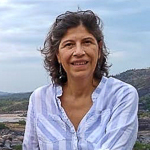
Hortensia Caballero-Arias, Venezuela
Dr. Hortensia Caballero-Arias, PhD, is a senior research associate at the Venezuelan Institute for Scientific Research. Her research focuses on the history and politics among Amazonian Indigenous peoples, Indigenous rights, and state-driven policies. In her projects, she promotes participatory approaches to empowering Indigenous communities. As a Fulbright Amazonia Scholar, she conducted research on Indigenous food systems in the Venezuelan Amazon, examining the impact of environmental factors and human activity on their diets, and the resilience of Indigenous strategies to ensure food security.
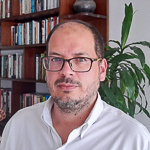
Carlos Del Cairo, Colombia
Dr. Carlos Del Cairo, PhD, is a Colombian anthropologist and professor at the Pontificia Universidad Javeriana in Bogotá. He specializes in socio-environmental dynamics in the northwestern Colombian Amazon. As a Fulbright Amazonia Scholar, Del Cairo explored local alternatives to deforestation led by campesino (local farm worker) communities. He also explored the histories of deforestation, coca cultivation, and armed conflict. As a Fulbright Amazonia Scholar, he works collaboratively to tell stories to local young audiences about the importance of strengthening community ties in the face of environmental changes.
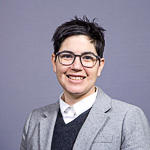
Beth Feingold, United States
Dr. Beth Feingold, PhD, is an associate professor of environmental health sciences at the University at Albany – State University of New York, where she is also the director of the undergraduate program in public health and the World Health Organization Collaborating Center on health and the environment. Her research focuses on the nexus between food, the environment, and health. For her Fulbright Amazonia projects, she collaborated with colleagues at CRONICAS Center of Excellence in Chronic Diseases at the Universidad Peruana Cayetano Heredia to conduct research on children’s environmental health, such as exposure to mercury, in the Southern Peruvian Amazon region of Madre de Dios.

Danny Pinedo, Peru
Dr. Danny Pinedo, PhD, is an associate professor of anthropology at Peru’s Universidad Nacional Mayor de San Marcos. He specializes in the intersections between Indigeneity and state formation in the Peruvian Amazon, with a focus on Indigenous ethnicities and territories. As a Fulbright Amazonia Scholar, Pinedo has conducted research in Peru showing that effective participation of civil society actors in decision-making processes improves environmental governance. He has collaborated with the Science Panel for the Amazon, universities, NGOs, scholars, and practitioners in understanding and promoting sustainability in the Amazon to inform environmental policies and empower marginalized groups.
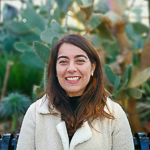
Paola Torres-Slimming, Peru
Dr. Paola A. Torres-Slimming, MD, PhD, is a researcher and professor at Universidad Peruana de Ciencias Aplicadas (UPC) in Lima, Peru. She provides medical education training to those working in rural and remote areas, incorporating sociocultural and environmental determinants of health. Her research addresses how Indigenous populations’ perspectives and cultures impact rural and remote health care and surveillance models. As a Fulbright Amazonia Scholar, her study focused on understanding mental health and well-being related to water security dynamics and environmental factors from the perspectives of local Shipibo-Konibo Amazonian Indigenous communities in eastern Peru.
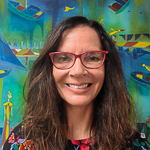
Simone Athayde, United States
Dr. Simone Athayde, PhD, is an applied environmental anthropologist, working as a research integrity lead at the World Resources Institute. Her work focuses on the intersections of biocultural diversity, Indigenous and local knowledge systems, and equitable development across the Amazon. As a Fulbright Amazonia Scholar, Athayde has initiated new collaborations and supported local organizations, start-ups and entrepreneurs, and amplified the voices of Indigenous peoples and local communities in the tri-border region of Brazil, Colombia, and Peru. Her efforts have advanced equitable and sustainable socio-bioeconomies (economies based on the sustainable use and restoration of ecosystems) as well as Indigenous and rural livelihood systems, in the Amazonia region.

João Campos-Silva, Brazil
Dr. João Campos-Silva, PhD, is the president of Instituto Juruá and a researcher at the Instituto Nacional de Pesquisas da Amazônia (INPA) and the Universidade Federal do Amazonas (UFAM). Based in Manaus, he researches the ecological, social, and institutional dimensions of community-based conservation, which involves local community participants in efforts to protect biodiversity in the Amazon. As a Fulbright Amazonia Scholar, João supported Indigenous and local communities in exploring the broad impacts of bioeconomy value chains on their livelihoods. He contributed to the empowerment of local communities by helping them integrate their aspirations, needs, and worldviews into a sustainable and inclusive regional development framework, so they were part of designing what a sociobioeconomy means to their community.
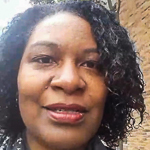
Mayra Esseboom, Suriname
Ms. Mayra Esseboom, MSc, has been working as a researcher on non-timber forest products (NTFPs) at the Centre for Agricultural Research in Suriname for the past fifteen years. This research is conducted in collaboration with rural, Indigenous, and tribal communities and focuses on the commercialization and marketing of NTFPs, as well as the empowerment of community-based organizations and micro-entrepreneurs. Her Fulbright Amazonia research has led to better understanding of how traditional knowledge combined with innovative marketing strategies can improve the position of traditional Maroon family units in the acai value chain. The fruit of the Brazilian acai palm tree has economic, nutritional and cultural value, from cultivation through production and export, resulting in opportunities to consolidate Maroon family shares in this growing market. This work has contributed to enhanced relationships with the University of Brasilia, the University of Florida, the Tropical Conservation and Development Program, NGOs, and various individual Fulbright researchers.
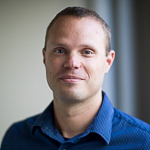
Bradley Olsen, United States
Dr. Bradley Olsen, PhD, is an engineer at the Massachusetts Institute of Technology who works on the development of bio-based and sustainable materials. His research focuses on the intersection of biology with polymer science, developing new sustainable polymer systems, bio-based materials, and advancing the underlying chemistry, physics, and informatics that enable materials design. As a Fulbright Amazonia Scholar, he has performed research in Brazil on the development of bioeconomies based around locally-sourced sustainable materials. In collaboration with researchers at the Federal University of Western Pará and the National Institute of Amazonian Research, he has worked to understand the availability of waste materials from non-timber forest products and fisheries that could be developed into new materials, such as packaging made from forest-product fibers. He has also developed contacts at the Bolivia-Peru-Brazil tri-frontier to better understand the impact of bioeconomies and potential for new developments in this region. Finally, he is capturing these research outcomes in new educational experiences that focus on international co-development of solutions to the world’s most pressing sustainability challenges.
More About Fulbright Amazonia
The Amazon River Basin contains the world’s largest and most biodiverse river as well as its largest rainforest, providing the planet with an irreplaceable ecosystem that is a habitat for 30 percent of the world’s plant and animal species and that absorbs two billion tons of carbon dioxide each year. The Amazon River is also a key source of food, medicine, and livelihood for more than 30 million people across the region.
The Fulbright Program launched Fulbright Amazonia in 2022 to create an international network of scholars and practitioners who will conduct research and recommend policies dedicated to protecting fragile eco-systems and improving lives and livelihoods in rural and Indigenous communities of the Amazon.
Fulbright Amazonia is a program of the U.S. Department of State, Bureau of Educational and Cultural Affairs , with funding provided by the U.S. Government and the Fulbright Commission in Brazil, with the additional support of other binational Fulbright Commissions and U.S. Embassies in the Amazon region. The program is administered by the Institute of International Education.